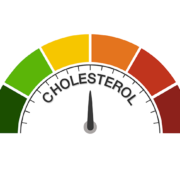Cholesterol under control
Our real age is not only that of the years we have lived, but above all that of our heart and blood vessels. The vitality of every cell that receives nourishment from them depends on their elasticity and patency. A condition of stiffness and narrowing of the arteries leads to progressive suffering of the irrigated tissues. According to the European Atherosclerosis Society, the optimal average values of cholesterol in the blood of an adult are considered to be less than 200 mg per 100 ml of blood. Excess cholesterol tends to accumulate in adipose tissue, lipomas, gallstones and vessel walls in the form of plaques, impairing their function and setting the body up for even severe cardiovascular problems.
Measures and supplements for cholesterol control
When cholesterol values are altered, a number of simple measures should be taken first: measure cholesterol, avoid being overweight, reduce sugars, limit animal fats, eat a diet rich in fibres, exercise regularly, take treatment if high values persist (fermented red rice, omega 3, statins)
Fermented red rice
Monascus purpureus is a natural saprophyte fungus found in fermented red rice. It is used in many regions of Asia for its protective action on the cardiovascular system. The ancient Chinese Pharmacopoeia Ben Cao Gan Mu, written during the Ming Dynasty recommended its use for the health of the heart and blood vessels. Recent clinical studies have confirmed the ability of the dried extract of fermented red rice with Monascus purpureus to maintain normal cholesterol levels.
Coenzyme Q10
It is an important antioxidant factor that controls oxygen flow in cells. Very similar to vitamin E, it is essential for cell respiration and regeneration. Its production decreases more and more with age. Its protective activity against free radicals attacking vessel collagen helps prevent vascular damage.
Omega 3
These are essential fatty acids that provide a crucial protective role against molecules that are harmful to the body, countering the inflammatory process, lowering the level of triglycerides and fluidifying the blood thanks to the anti-aggregation activity on the platelets.
Plant fibres
They strengthen and maintain intestinal balance (bifidogenic action). Plant fibres are a valuable source of energy for the colon mucosa, influencing fat and carbohydrate metabolism by controlling blood sugar and reducing cholesterol concentration.


 Specchiasol
Specchiasol Specchiasol
Specchiasol



 Specchiasol
Specchiasol Specchiasol
Specchiasol